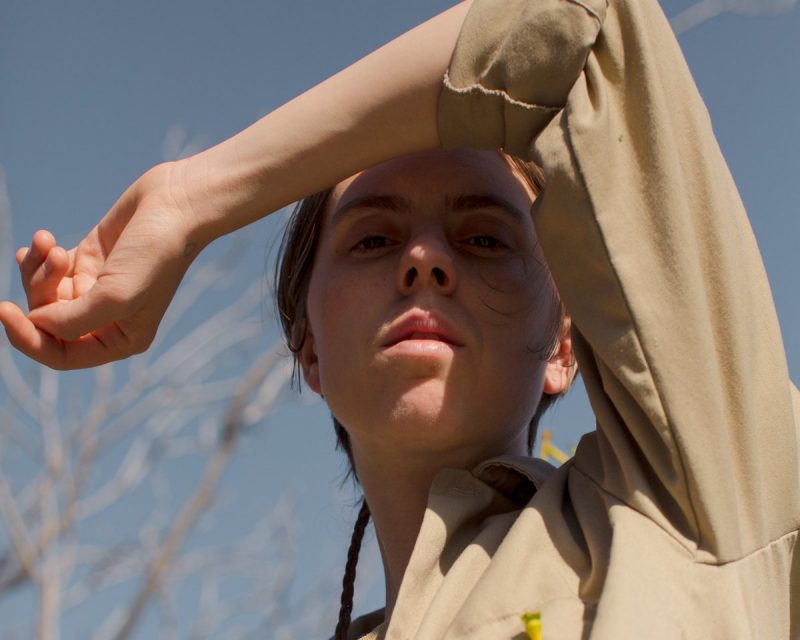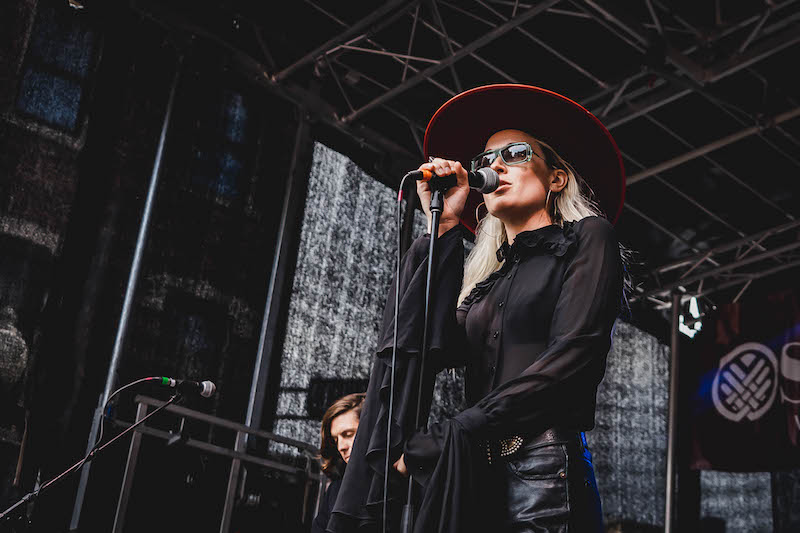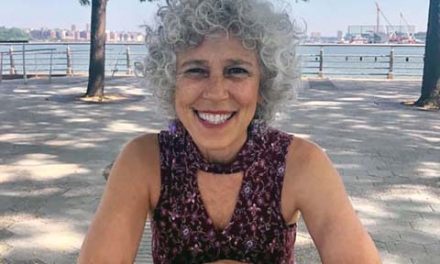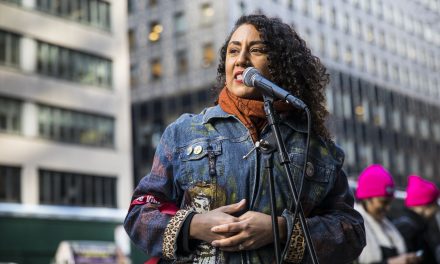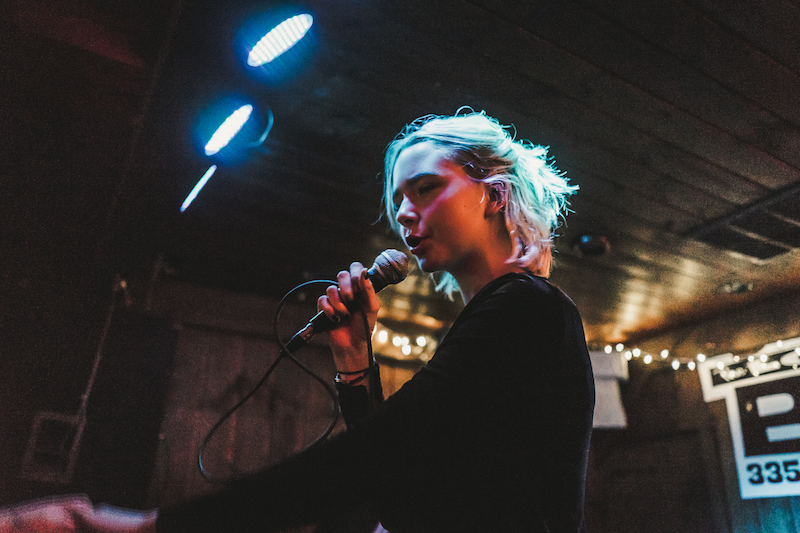The people who’ve played music with Meg Duffy speak of their guitar playing in otherworldly terms.
Erin Birgy of the mystifying Seattle band Mega Bog says she and Duffy (they/them) believe “that songs and music are spells and magic that take a lot of work and care to perfect, to responsibly release ‘out there.’” Austin via Albany songwriter Olivia Quillio says her and Duffy’s innate musical connection “seemed magical,” and the language of songwriting between the two of them speaks more fluidly than words. Acclaimed guitarist William Tyler (formerly of Lambchop and Silver Jews) remarks that Duffy’s performance balances “passion and sympathy,” two curious traits to select while describing the way a person plays an instrument.
Even Duffy considers playing music as a sort of transcendental practice.
“Nothing feels similar to playing music, and I think just when I felt what that felt like, I realized that it was a really unique experience—spiritually, really,” Duffy tells The Collaborative. “Sex doesn’t feel that way, love doesn’t feel that way, eating…nothing feels that way. Especially playing music with other people, but even playing music by yourself is so therapeutic.”
All of these accounts would be heavy-handed if they weren’t such accurate descriptions of the way Duffy’s music sounds and feels—two separate sensations that they’re so brilliant at melding into one. The music they make under the name Hand Habits is windswept, pastoral indie-rock with an old-soul folk spirit. placeholder, the second Hand Habits album that just dropped in March, is full of loping, nodding tunes that exude an all-the-time-in-the-world level of patience. Their music has been fairly characterized as “chill,” but slapping it with the same tag one would a Mac Demarco record, or a lo-fi hip-hop beats compilation, is criminally underselling the vivid color Duffy conjures out of an otherwise grayscale palette.
Take a placeholder standout like “jessica,” where Duffy’s murmuring vocal hook is as valuable a melodic component as their starry, flickering guitar solo. In one of the record’s more jittery cuts “can’t calm down,” Duffy’s masterfully layered solo crawls out of the clean lead riff, pitter-pattering between the left and right channels and illuminating the whole mix before abruptly burying itself. It’s the aural equivalent of heat lightning, a common sighting in the California locale where these songs were conceived.
However, long before Duffy was writing their own songs that earn praise from The New Yorker, Pitchfork and NPR, and playing guitar on albums by Weyes Blood, Kevin Morby and The War On Drugs’ grammy-winning A Deeper Understanding, they were cutting their teeth as a guitarist in the Capital Region.
An Amsterdam native, Duffy enrolled in Schenectady County Community College (SCCC) after high school and studied guitar performance for two years. Prior to college, Duffy played in cover bands with their friends in high school, rehashing everything from Led Zeppelin and Pink Floyd to Weezer and Sum 41. However, Duffy’s SCCC program was mostly jazz-based, which allowed them to scratch their itch to play more complicated, rootsy material.
“I definitely was challenged musically in a way I was aching for, in a way I had never been,” Duffy remembers. “I really like to be told what to practice and having a curriculum worked for me in terms of getting technically better at guitar.”
Motivated by being the only non-male in the program, Duffy practiced voraciously and often at the expense of their other classes. However, they felt welcomed by their peers and inspired by their part in the program’s little community, which was rich with first-rate students and professors. Their studies were integral in nursing their desire to take music seriously, but it was the Capital Region local scene, particularly the DIY folk and rock sectors, that served as Duffy’s jumping-off point.
“After college I started playing with these singer/songwriters like Olivia Quillio, MaryLeigh Roohan, Caroline Corrigan and these really, really talented songwriters in Upstate New York,” they say. “An
d learning how to be supportive musically and not, like, a soloist.”
One of their first collaborators was Quillio, a forward-thinking jazz singer/songwriter who had dropped out of SUNY Potsdam to pursue music full-time while living in Troy. The two first met when Duffy approached Quillio at her coffee shop job upon recognizing her through a mutual friend.
“We sort of nervously knew each other’s talents and got together a few times,” Quillio remembers. “Meg came over and shared this sweet-ass song that they wrote and they were like, ‘It’s not really anything, I don’t really do stuff.’ And I’d been performing for a little while then so I was pretty rooted in songwriting and I remember just looking at them and being, like, ‘Uh, you’re a songwriter. Like it or not, this is gonna be the rest of your fucking life.’”
Duffy says that they had been playing guitar for almost six years before they wrote a single song.
“And I think that that comes partially from one time someone saying to me, when I was trying to sing a song, ‘Maybe you should just stick to playing the guitar.’ Which is so fucked to tell a kid because as an adult, I still remember the moment and being like, ‘Wow, my voice sucks. I shouldn’t sing.’”
“It’s really stupid. I go to therapy,” Duffy laughs. “And make records professionally.”
However, Duffy also just liked playing guitar for other people’s music—which they still do, as they’re an accomplished session musician outside of Hand Habits. They played with Quillio for about four years in the early 2010s, which helped them hone their skills and learn to play in a way they hadn’t previously.
“I definitely found that [sic] role of being someone else’s guitar player creatively, and not overtly—and knowing where to take space and knowing what to bring, and making like loops and stuff…and bringing a lot to the table as a guitar player and not just being the person who takes the solo. I felt really comfortable doing that and just letting someone else shine and just adding to what they were having to say,” Duffy says.
Quillio stresses that their musical relationship was profoundly beneficial for both of them, and the special bond they shared while playing is unlike any she’s ever experienced.
“Meg helped put me on the map and believe that my own music was worthy enough,” Quillio says. “They were one of the only people that would be present enough with me and my music onstage. I still think that’s true. I have a really hard time apart from people like Meg Duffy and Dylan Perrillo, like actually being in a song with me or being in a sound with me. Which is why I think Meg is so successful. They know exactly what their sound is and they’re in it.”
Despite feeling timid about writing their own songs, Duffy was strikingly confident at asking to play in other established bands throughout the area. The aforementioned songwriters introduced them to the Albany scene in the early 2010s, which included popular local bands like Aficionado and Better Pills. But Duffy wasn’t afraid to approach these musicians and convince them they were worthy of contributing to their sound.
“I think at one time when I was in Albany I was literally in seven bands,” Duffy recalls. “I asked to be in Better Pills. Kind of a bold ask, I didn’t know anybody in the band and I was like, ‘I really want to be in your band.’”
At some point during that whirlwind time period, when they were living in a house on Madison Avenue in Albany with Quillio, Emily Sprague (Florist) and Jonnie Baker (Florist, Bellows), Duffy started writing and performing as Hand Habits. They started playing frequently around the area, but Duffy says the band sounded drastically different than it does today.
”It was a very rockin’ band and very much dictated by the people I was playing with, and also just [because I was] young and [didn’t have] a solid idea of what my voice was yet.”
Then one day Hand Habits got asked to play a show in Albany with Mega Bog, a pretty underground West Coast band that Duffy had become obsessed with after stumbling upon their music on Bandcamp.
“I was searching the hashtag ‘cave.’ And I found Mega Bog and I was so into the music,” Duffy remembers. They now have two Mega Bog tattoos.
“I had never even thought that I would ever see them because I was so new to the whole music scene, I didn’t even consider that touring was a thing that people did. I was like, ‘Wow this band lives in Seattle, I’ll never see them.’ I had never been on the West Coast.”
Reflecting on their charming naivety, Duffy remembers that they were elated to meet Mega Bog songwriter Erin Birgy when she arrived at the venue. Unfortunately, it didn’t go as well as planned.
“Erin was very rude to me at the show. She was not trying to be my friend at all, they had driven a really long time and I remember being really excited to meet her and being like, ‘Hey I’m such a fan.’ And she was like, ‘Cool can we go before you because we drove a really long time and we’re all really tired?’ And I was like, ‘Uh sure, yeah, no problem.”’
Birgy remembers being taken aback more than anything.
“My first impression was a little like, ‘Wow, I didn’t know there were massive Mega Bog fans who would act this stoked when they met me. But it was really sweet.”
The awkwardness of their initial interaction didn’t sway Duffy from making their biggest ask yet, though. A few months later, in 2014, Mega Bog posted a Facebook solicitation for a touring guitarist, and Duffy responded vigorously until Birgy eventually agreed to bring them down to NYC for an audition.
“Meg would call every couple days, very professionally—which was new and strange to me—to check in, and tell me about making charts and practicing,” Birgy says. “I had no idea what to expect, but Zach [Burgy] and I flew into JFK and were swooped by Matt [Bachmann] and Meg for an 8 a.m. rehearsal where Meg just shocked us by playing every part perfectly.”
Birgy promptly asked them to join the band and Duffy began touring with them around the country, eventually playing on Mega Bog’s 2017 album, Happy Together.
“Meg’s energy, I think, made us all feel like really good musicians, not just DIY poetry clowns anymore,” Birgy says. “Things just got sweeter and weirder from there on…Meg has always been deeply supportive, in micro and macro ways, of me. Being around each other is fire, or at least Meg has a way of bringing the fire out in people around them.”
Duffy says they learned a lot from playing with Birgy, a deeply unconventional songwriter with a keen sense for abstract melodies and genre-bending arrangements. The music was unlike anything Duffy had ever been forced to play previously, but they say that Birgy trusted them unflinchingly and gave them a lot of freedom in the studio.
“She would give a sound and be like, ‘I want it to sound like [makes a caterwauling shriek].’ And I would figure out how to make that sound because I wanted her to be proud of me because I also looked up to her so much as an artist, and still do,” Duffy says.
“I also learned when not to play,” they add. “Mega Bog is definitely not a band where I’m playing a chord. I don’t think I would ever play just a regular cowboy chord in a Mega Bog song and she really recognized my guitar playing as a melodic voice and that was really cool, too.”
About a year after that initial run of dates with Mega Bog, Duffy was playing with Better Pills when they had a gig opening for Kevin Morby. The up-and-coming folk-rock songwriter was already well-established, having begun his career in the short-lived, garage-rock group The Babies and then spending some time in acclaimed indie-folk band Woods. Duffy and Morby’s connection was instantaneous.
“I met him opening for him when I was playing in Better Pills and I approached him and I felt really drawn to him,” Duffy says. “And we both knew that we were going to be really important to each other. We both talked about it a lot.”
“It happened really, really naturally. I was just like, I would really love to to play music with you and almost six months later I was in the band.”
At first Duffy was playing bass for Morby, which they had to teach themselves, having never played it before. Eventually they moved over to lead guitar, and it was there that Duffy cemented themselves as a nationally-desired guitarist. They played on Morby’s excellent 2017 album City Music, and it was around that time that Duffy moved from the Capital Region out to Los Angeles to begin their career as a session musician.
In addition to the aforementioned artists, Duffy has played on records by Miya Folick, Chris Cohen, Amber Arcades, among others. However, their most notable contribution as a session musician remains that War On Drugs album. Duffy still marvels at witnessnessing Adam Granduciel’s intensely perfectionist process.
“Seeing the way that Adam from War On Drugs works. He does, I’m not joking, sometimes 50 versions of the song. That’s not a joke, that’s not an exaggeration. I don’t even know how he makes his final decision.”
It takes a certain type of person to get drafted by a creative like Granduciel, and Duffy thinks their flexibility and strong work ethic are two of their most attractive assets to a person like him.
“I am down to keep playing it over and over again, and I like when people tell me what to do. I think that’s something that’s really fun, especially when someone is like, ‘No that’s not how it should be,’ or ‘That’s not the right thing, let’s try something different.’ I think I’m really good at taking direction.”
That being said, Duffy always writes their own parts for the session work they do.
“I don’t think that someone needs to hire me to play a part that someone else can play,” they say.
An interesting observation they’ve made from their career as a session musician is that sometimes they’re not exactly sure what they’re being hired for. As in, what about their specific playstyle is so fitting for a given piece of music.
“I think with session playing you’re either being hired for doing the thing that you’re known for, or you’re being hired to do something that you maybe don’t even know that you do.”
One of their most recent collaborations was for William Tyler’s 2019 record, Goes West. The album is a fully instrumental Americana record produced by big-time studio wiz Brad Cook (Bon Iver, The War On Drugs) that features additional guitarwork from legendary jazz maestro Bill Frisell. In a recent Pitchfork interview, Duffy described their initial nervousness going into that session, and the subsequent comfort from Tyler’s validating encouragement. He’s someone who sees something in Duffy that they themselves might not even be able to pick up on.
“Playing with Meg is effortless in that there is an inherent flow and lyrical dialogue to their playing,” Tyler says. “Meg finds the notes within the notes and the notes that mirror the notes—they have that rare quality of technical exactness and feel/vibe for days. I don’t think I ever told them to make a choice in terms of phrasing or melody—Meg just has that ability to perfectly elevate a song.”
Although they’re currently rubbing shoulders with some of the most renowned figures in modern rock music, Duffy’s dedicating the rest of 2019 to touring on the Hand Habits record. They’re finally at a place where they’re getting the opportunities they’ve not just dreamt of—but always known that they were going achieve.
“Meg and I used to talk about getting signed to Sub Pop and this kind of stuff when we were [teenagers], and it’s not unrealistic,” Quillio says. “Meg continually reinforces the beliefs that all of us had when we were 19 and together. That this is what we’re here to do.”
Quillio emphasizes that Duffy’s setting an example for the rest of the Capital Region—and DIY communities as a whole. “About being confident and continuing to work and holding the light for yourself,” she says.
“Meg’s work was always this good. They get a lot of accolades now from bigger publications and I’m glad, because they deserve it so much. But don’t stop looking for that sort of art. And that’s what they’re setting the stage for. True artists to show their true selves as they are.”
“I just really hope that we can see the kind of light and success that a person like Meg Duffy has and continue to work on our own art and understand that it could be next week that somebody else that you’ve never met from Troy is another Hand Habits. Or somebody from Catskills. We should all be listening to each other’s work as hard as we’re listening to Meg.”
Hand Habits is nominated for ‘Outward Bound Artist of the Year’ for the Capital Region Thomas Edison Music Awards (‘The Eddies’). Winners will be selected by a group of over 60 area judges and presented on April 14.
Hand Habits play The Church in Troy on April 8 at 7 PM and The Half Moon in Hudson on April 9 at 8 PM.

